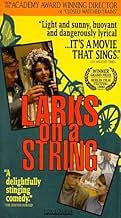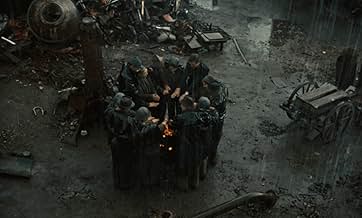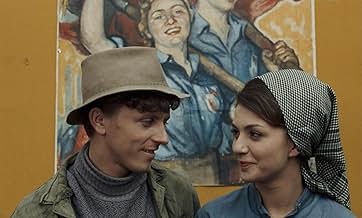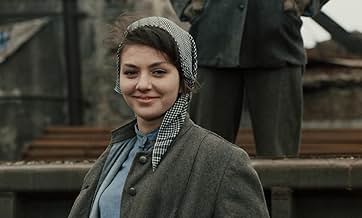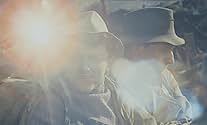AVALIAÇÃO DA IMDb
7,3/10
2,3 mil
SUA AVALIAÇÃO
Adicionar um enredo no seu idiomaSet in the late 1940s, the film concerns the treatment of suspect "bourgeois elements", a professor, a saxophonist, and a milkman, who are put to work in a junkyard for rehabilitation.Set in the late 1940s, the film concerns the treatment of suspect "bourgeois elements", a professor, a saxophonist, and a milkman, who are put to work in a junkyard for rehabilitation.Set in the late 1940s, the film concerns the treatment of suspect "bourgeois elements", a professor, a saxophonist, and a milkman, who are put to work in a junkyard for rehabilitation.
- Direção
- Roteiristas
- Artistas
- Prêmios
- 3 vitórias no total
Eugen Jegorov
- Saxophonist
- (as Evzen Jegorov)
- Direção
- Roteiristas
- Elenco e equipe completos
- Produção, bilheteria e muito mais no IMDbPro
Avaliações em destaque
Set in a scrap metal yard at the great Kladno steelworks, at the time of its making (just as the Prague Spring was being terminated by the Russians) this was seen as a satirical attack on the Communist regime, which got both film and director Jiří Menzel banned for several years (the film was not released until 1990). How such a gentle film could be seen as so subversive now seems incredible nearly 4 decades later.
Sorry, Liehtzu, but it couldn't possibly be better than the sublime "Closely Observed Trains"! Maybe this is because that film is so timeless, whereas "Larks on a String" seems to have dated less well; it is now more of a series of formless sketches of erotically charged comedy, in which the Czech spirit always manages to triumph over oppression and even the "villains" elicit a certain sympathy.
Even so it is a gem of a film, witty, quirky and subtle, in which a bunch of renegade intellectuals, sent literally to the scrapheap, put the world to rights and try to engage with the pretty girls working over the metal mountain.
The DVD available in the Czech Republic (R2) has rather unreliable English subtitles, so much of the biting dialogue is lost in translation; still a wonderful film though.
Sorry, Liehtzu, but it couldn't possibly be better than the sublime "Closely Observed Trains"! Maybe this is because that film is so timeless, whereas "Larks on a String" seems to have dated less well; it is now more of a series of formless sketches of erotically charged comedy, in which the Czech spirit always manages to triumph over oppression and even the "villains" elicit a certain sympathy.
Even so it is a gem of a film, witty, quirky and subtle, in which a bunch of renegade intellectuals, sent literally to the scrapheap, put the world to rights and try to engage with the pretty girls working over the metal mountain.
The DVD available in the Czech Republic (R2) has rather unreliable English subtitles, so much of the biting dialogue is lost in translation; still a wonderful film though.
Before Larks on a String, Jiri Menzel had made his most famous film Closely Watched Trains (1966) which even won an Oscar for Best Foreign Film. Larks on a String wasn't such a big success because it was immediately banned in 1969 when it was made. The new fresh waves that came to Czechoslovakia in the 1960's made the making of the film possible and it was made in the spirit of the revolution -- The Prague Spring in 1968. Even that Menzel has always been a humanist as an artist his views were this time too much for the communist politicians and therefore he got a five-year prohibition for making movies; and Larks on a String wasn't released until the fall of communism in 1990.
I have had the privilege to see this wonderfully absurd film twice on the television. It is a warm-hearted story about an industrial scrap yard where "volunteers" produce cheap steel. In this yard a group of volunteers are being re-educated from their filthy bourgeois lives to loyal workers in the name of socialism. The group includes a musician, a philosopher, a dairyman, a barber, a prosecutor and a young chef. On the other side of the yard there is a group of female prisoners who are working for trying to defect. Without the strict rules, boundaries and supervision, romantic relationships start to build between these characters.
In Larks on a String Menzel achieves to relay his view on the poetry of life. But the lyricism of the film is characterized by bitter irony because reality, hypocrisy and cruelty of the society exhale from the director's comedy. The entire scrap yard is, of course, a sarcastic metaphor for the experimentations of the East-European countries. The former enemies are being re-educated into common workers and from the trash of the old world a new society is built. But nothing is real: people are arrested for obscure reasons, the secret police controls everything and even the qualification of the steel is poor. However, even in these conditions people are people and they try to make the most of it.
The Czechoslovakian New Wave found its inspiration from France but also from their own greatest writer Franz Kafka. In turn, they gave inspiration for many modern filmmakers. During the Hungarian Revolution in 1956, a Marxist philosopher called Georg Lukács said that "Kafka was a realist" after all. It is an important observation while reading Kafka but also works as the main thesis for the entire Czechoslovakian New Wave: because wasn't fierce, ruthless humor really the only way to deal with the absurdity of being in the Communist countries of Eastern Europe?
Therefore, we shouldn't just watch Larks on a String as an absurd tragicomedy because this was real -- and that's why we can call it realism for its goals and bases which were both social. Even though the film portrays human fates, crushed by the repressive governance, the film is also full of joy, love and mundane beauty.
I have had the privilege to see this wonderfully absurd film twice on the television. It is a warm-hearted story about an industrial scrap yard where "volunteers" produce cheap steel. In this yard a group of volunteers are being re-educated from their filthy bourgeois lives to loyal workers in the name of socialism. The group includes a musician, a philosopher, a dairyman, a barber, a prosecutor and a young chef. On the other side of the yard there is a group of female prisoners who are working for trying to defect. Without the strict rules, boundaries and supervision, romantic relationships start to build between these characters.
In Larks on a String Menzel achieves to relay his view on the poetry of life. But the lyricism of the film is characterized by bitter irony because reality, hypocrisy and cruelty of the society exhale from the director's comedy. The entire scrap yard is, of course, a sarcastic metaphor for the experimentations of the East-European countries. The former enemies are being re-educated into common workers and from the trash of the old world a new society is built. But nothing is real: people are arrested for obscure reasons, the secret police controls everything and even the qualification of the steel is poor. However, even in these conditions people are people and they try to make the most of it.
The Czechoslovakian New Wave found its inspiration from France but also from their own greatest writer Franz Kafka. In turn, they gave inspiration for many modern filmmakers. During the Hungarian Revolution in 1956, a Marxist philosopher called Georg Lukács said that "Kafka was a realist" after all. It is an important observation while reading Kafka but also works as the main thesis for the entire Czechoslovakian New Wave: because wasn't fierce, ruthless humor really the only way to deal with the absurdity of being in the Communist countries of Eastern Europe?
Therefore, we shouldn't just watch Larks on a String as an absurd tragicomedy because this was real -- and that's why we can call it realism for its goals and bases which were both social. Even though the film portrays human fates, crushed by the repressive governance, the film is also full of joy, love and mundane beauty.
It's 50 years almost day-to-day since the Red Army and the armies of several "fraternal" states invaded the Czechoslovak Socialist Republic and put an end to the experiment of socialism with a human face that had been tried by Alexander Dubcek and the Czechoslovak Communist leadership. I do not know whether it is a coincidence or not, but the timing was excellent for the screening and viewing of Jiri Mendel's 1969 film 'Skrivánci na niti' ('Larks on a String') as part of the Czech film festival in Israel, a film that could not meet with its audience for 20 years, as it was banned by the communist censorship until the fall of the regime.
For the audience in my native Romania who lived during communism, Mendel's film will not only show themes and situations similar to those they lived, but its fate will remind the one of the film 'Reconstituirea' ('Reconstitution') made in the same period in Romania by Lucian Pintilie: The same attitude of protest and resistance, the same subtle symbolism, the same sympathetic approach to the characters, and ultimately a similar fate - the film was banned by censorship and kept 'on the shelves' for twenty years. The action in 'Skrivánci na niti' is placed in time in the early 1950s when the Communist dictatorship began to consolidate and 'class enemies' were sent to forced labor or prison for the guilt of having belonged to the 'bourgeois classes' or for the crime of trying to escape from the 'socialist paradise'. The setting is symbolic - a plant where industrial waste is brought to be transformed into useful objects, and the people who robot are the human waste that needs to be re-educated to become the 'new type of human beings'. Those who turn out to be non-educated disappear, arrested by the political police and forced into the car that will lead them to more severe prison or labor camps, the next stage of repression.
Unlike Lucian Pintilie's Romanian film, which was an exception, Jiri Mendel's creation was part of a more developed cinema school, with creators like Milos Forman, Vera Chytilová or Mendel, who managed to create several remarkable films demonstrating that - within the limits of the communist censorship tolerance - making quality films was possible even behind the Iron Curtain. The look that Mendel throws back in those years of relative hope for Eastern Europe toward the beginning of the communist era is not characterized by anger or hatred. The characters of the period are presented in their humanity, even the prison guardians or the bureaucrats of the regime are surprised in situations that make them ridiculous rather than abject. Criticism is especially directed against the system, with all its power to oppress and is absurdity worthy of Kafka's country. Visual power and acting are remarkable. Jiri Mendel's film made half-century ago, has successfully passed the exam of time.
menzel's "larks on a string" is even better than his "closely watched trains." supressed for decades in its home country this sharp, bitter and exuberant little comedy showcases its director's unique ability to mix humour and tragedy to great effect. a lyrical love story set in a scrapyard full of political dissidents who are occasionally carted off by secret police (never to return) if they talk out of turn. in the end it's an ode to the czech people, depicting them as refusing to be broken, full of a lust for life that cannot be contained even in the darkest times. some truly funny, great moments make for a deceptively simple, beautiful little movie.
Set in the late 1940s, the film concerns the treatment of suspect "bourgeois elements", a professor, a saxophonist, and a milkman, who are put to work in a junkyard for rehabilitation.
Director Jiri Menzel, a member of the Czech New Wave, became internationally famous in 1967, when his first feature film, "Closely Watched Trains", won the Academy Award for Best Foreign Language Film. Then came "Larks", which was filmed in 1969, but not released until 1990! That is quite a feat.
Although interesting and a tad surreal, I have to wonder if the reception would have been different in 1969. Appropriately celebrated upon release in 1990, would it have had a bigger impact if it was out when the regime was still in charge?
Director Jiri Menzel, a member of the Czech New Wave, became internationally famous in 1967, when his first feature film, "Closely Watched Trains", won the Academy Award for Best Foreign Language Film. Then came "Larks", which was filmed in 1969, but not released until 1990! That is quite a feat.
Although interesting and a tad surreal, I have to wonder if the reception would have been different in 1969. Appropriately celebrated upon release in 1990, would it have had a bigger impact if it was out when the regime was still in charge?
Você sabia?
- CuriosidadesFilmed in 1969, the film was withheld by the censors and released only in 1990 after the fall of the Communist regime.
- ConexõesEdited into CzechMate: In Search of Jirí Menzel (2018)
Principais escolhas
Faça login para avaliar e ver a lista de recomendações personalizadas
- How long is Larks on a String?Fornecido pela Alexa
Detalhes
Bilheteria
- Faturamento bruto mundial
- US$ 20.378
Contribua para esta página
Sugerir uma alteração ou adicionar conteúdo ausente

Principal brecha
By what name was Andorinhas por um Fio (1969) officially released in Canada in English?
Responda
